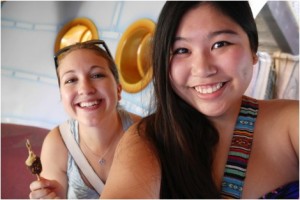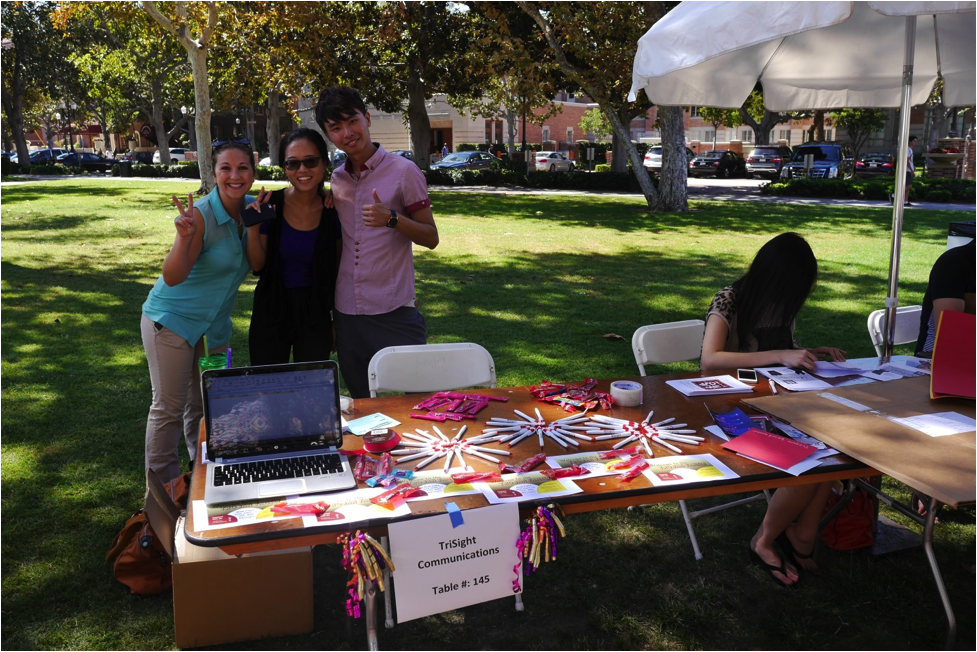
1. Magic happens when you say “yes” to opportunities
Did you know the story of how I became co-president of TriSight? The truth is that when the call came for students to apply for Executive Board positions, I didn’t even think about applying – let alone aim for the top job. I didn’t feel like I was good enough of a PR practitioner, experienced enough with American culture, or immersed enough with the student body. It was a random afternoon when one of my classmates – Laura, who is now my fellow co-president – called me. She told me I would be a great co-president and that she wanted to work with me. She was applying for the job, and she thought I should too. That vouch of confidence was startling, un-president-ed (just kidding, I’m so punny, I meant unprecedented) and long story short, she persuaded me that I was good enough to apply. So I applied, interviewed and got the gig. I can’t imagine how different life would be if I had not said “yes.” Fast forward ten months since we took presidency: not only has Laura become one of my best friends in LA, I’ve made so many new friends and built relationships with clients that I otherwise would never have.
2. Make yourself an asset to everyone around you
In my humble opinion, the hardest thing about being a student leader is getting students motivated to be a part of your organization. It’s still a challenge we face every day, but the successes the agency has reaped is largely due to our peers. How can you bring that to a personal level? For example, I try to help my classmates whenever I can, whether it’s proofreading their assignments to editing essays. More importantly, I feel like a large part of the student body support for work I’m involved in stems from those very same people that I’ve helped. In a professional setting it’s more than just “that’s what friends are for” – it’s about fostering a community that supports its members.
3. Don’t be burnin’ bridges
Even if you’re not in the public relations industry, don’t dismiss the ability to network as something you don’t need. You never know when you need a reference from a professor regardless of if you didn’t actually like their class. Don’t think it’s okay to make enemies of people you’ve had to work with in teams just because you couldn’t stand to be in the same room with them by semester’s end. While this doesn’t mean that you have to hold out for universal appeal – we all know this is impossible! – it would be beneficial in the long run to be pleasant to people and to keep in touch with those you’ve crossed paths with. For example, if we turn down clients for TriSight because we have too much on our plate, we make it a point to keep them on our radar for future opportunities.
4. Make “Dependable” your middle name
Everyone loves working with a Mr. or Ms. Dependable! When your supervisor or client assigns you work, he/she should have the peace of mind knowing that you will get it done. This is one of the biggest struggles a student leader has to deal with: making sure that your organization members do their work, meet quality standards and deliver on time. I’ll be honest: sometimes it feels impossible to demand that level of professionalism from all college students, but with perseverance and effective follow-ups, you can get the work done. It’s important to be dependable yourself, so that you set a good example for what you expect from your peers.
5. Last but not least, don’t take yourself too seriously!
I know we’re all answerable to clients, faculty advisors or national chapters, but don’t forget to have fun while you lead a student organization! We’re still in this campus-level sandbox where we’re allowed to make mistakes and learn from them. We’re all just getting our feet wet and gearing up for the working world, and we’re all in the same boat. Build memories, create experiences and, most importantly, make new friends!




